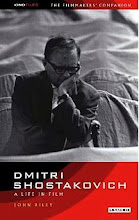 In case you thought I'd forgotten about it - a heads-up/reminder of Between Two Worlds, the Alfred Schnittke festival led by the LPO and happening at various places in London from 15 November to 1 December to mark what would have been his 75th birthday.
In case you thought I'd forgotten about it - a heads-up/reminder of Between Two Worlds, the Alfred Schnittke festival led by the LPO and happening at various places in London from 15 November to 1 December to mark what would have been his 75th birthday.It's hard in the course of such a mini-fest to do justice to the enormity of Schnittke's output (even if you think - as I don't - that it's wildly uneven). Of course there are things I'd want to have seen, primarily the hallucinogenically terrifying First Symphony, and one of the last symphonies, and perhaps a survey of the concerti grossi (and of course, more films!) but over all it's as balanced as it could be in the time available.
The LPO has a minisite devoted to him here.
The main stuff is:
15/11. The Gogol Suite and the (brilliant) Monologue followed by Prokofiev 6 at the RAM.
18/11. Royal Festival Hall. A 6.15 pre-concert event with the 3rd SQ (his best?) played by the Harpham Quartet. Then, in the main concert, rather than just doing the Faust Cantata, there are excerpts from the opera that swallowed it (basically as Act 3). These are semi-staged, so perhaps Jurowski is moving towards a very welcome production - in which case, hopefully he'll be conducting what Schnittke wrote rather than the 'Hamburg edition'. It's preceded by Haydn 22 (is the subtitle the only link?) and bits of Parsifal. Here's a bit of Arte's broadcast of Historia von D. Johann Fausten. Would that BBC4...
19/11. Back at the RAM for a visit from the Moscow Conservatory Chamber Choir and a good belt of Russian choral stuff. The Concerto for Choir is another cast-iron masterpiece.
21/11. An all-day symposium at Deptford Town Hall under the aegis of the Alfred Schnittke Archive at Goldsmiths. Even those usually averse to academic conferences might be tempted by the world premiere of the Concerto for Electronic Instruments. This includes four ekvodins (a 1930s Soviet synthesiser), a crystadin (something to do with Oleg Losev's research, I assume), a camerton piano (errrrr...?) and a shumophone (even more errrr... but it sounds polyglottally tautological: 'shum' [шум] being Russian for 'noise' and 'phone' being Greek for 'sound'). In such company the theremin that the estimable Lydia Kavina will be playing seems almost workaday!
On 22/11 those able to keep up will be headed to the South Bank Centre for another all-day-er. Amongst the talks will be an unmissable interview with animator Andrei Khrzhanovsky, director of, inter alia, The Glass Harmonica fresh from his debut feature (of which more anon) A Room and a Half. The other music will include the hilarious Music for an Imaginary Play, the fantastic Epilogue from Peer Gynt and the Kandinskian Der gelbe Klang, which I seem to remember being really interesting (if only I could find that decade-or-so old off-air cassette).
25/11. Ater a couple of days rest you'll be ready to venture back for a kaleidoscopic look at old musics: Stravinsky, the venerably double-barrelled Bach-Webern, Schnittke and Safronov. That's at 6pm, after which there's another concert: Webern, Lindberg, Berg and Schnittke's Third Symphony. I prefer Schnittke's (more secular) odd-numbered symphonies and this is one of my favourites - a piece I find endlessly fascinating.
Films are covered at Pushkin House on 26 and 27 (The Ascent and Commissar) and 28 at the RFH (Agony). Later on the 28th at the RFH there's a concert with an interesting pairing: Schnittke's Second Cello Concerto (which uses some of Agony's music) and Haydn's Seven Last Words. The Schnittke is being played by Alexander Ivashkin (he and conductor Vladimir Jurowski are the main movers behind the festival), who, just a few days ago, was in Moscow playing and conducting a concert of Unknown Schnittke. Hopefully there'll be a CD or at least some more performances.
Things are wrapped up on 1 December at the QEH with the String Trios by Schnittke and Tchaikovsky.
 Alexander Ivashkin's written several books about Schnittke, including a biog-intro (published by Phaidon) that should be every anglophone's starting point
Alexander Ivashkin's written several books about Schnittke, including a biog-intro (published by Phaidon) that should be every anglophone's starting pointAs an adjunct I'm doing a one-hour intro to Schnittke and his music for Resonance 104.4fm on Friday the 13th at 8pm. Also listenable on-line.

